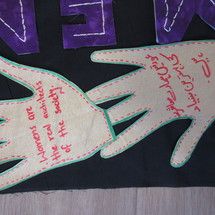
Pauline Diamond Salim joined in banner making workshops at Scottish Refugee Council as part of PROCESSIONS 2018
When we first heard about PROCESSIONS 2018, the UK-wide public art project marking the centenary of women’s suffrage in the UK, we weren’t sure whether or not to get involved.
On the one hand, we were excited at the thought of thousands of women across the country gathering to mark this moment in history. On the other hand, there was a definite sense of, well, perhaps this isn’t quite for us.
Most of the women we work with, those with refugee status and those still in the asylum system, don’t have the right to vote in the UK. How could we celebrate women’s suffrage when it hadn’t yet been achieved a full one hundred years after the 1918 legislation?
In the end we put the question of whether or not to take part to the women we work with and went ahead based on their desire to be part of the project.
But what would our group talk about if they weren’t able to talk about voting?
PROCESSIONS is about more than just a public gathering on June 10.
As part of the project, groups of women across the country were encouraged to get together and discuss what the right to vote means to them.
Our conversations at Scottish Refugee Council were very different. We talked about what it means to participate in society, to have a voice, to have a say in the things that matter to our daily lives and to our children’s futures. The right to vote is at the heart of this but we talked about the many other ways to participate. And the many other ways society excludes women from refugee backgrounds.
Our group talked about the challenge of living in a foreign society, finding your way, finding a community, finding your voice. We talked about overcoming language barriers, hostility and racism, both institutional and in everyday encounters. We talked about the never ending exhaustion and insecurity of the asylum system, about raising children alone far from family networks. About enforced poverty and poor accommodation. About cultural expectations of women both here in the UK and in the countries they grew up in. We talked about friendship and community, creating a place to belong and welcoming other women into this place.
As we talked we cut and sewed pieces of fabric. We made shapes and letters and words in an attempt to sum up the threads of these conversations.
The group stitched these words and images onto a banner. The beautiful banner our group created expresses the strength of women who have come through the asylum system and the power of women’s conversation and collective action: the strength it takes to live in a system that tries to exclude you and to still get up and raise children and make friends and build a life, working, volunteering, caring for others, participating in a multitude of ways.
Over the course of four workshops the group met and chatted and stitched threads of the banner together. Textile artist Paria Goodarzi led these sessions, encouraging the flow and exchange of ideas and insights, and overseeing the creation of the banner. She said: “What really surprised me about this project was the passion of the women who took part. Everyone had something to say and a unique message they wanted to convey in the banner. Right from the first workshop the women were chatting and opening up about the things that matter to them, the issues in their lives and solutions to problems.”
Our first workshop took place at Glasgow Women’s Library, where Paria collaborated with artist Helen de Main and the group examined archive materials held by the Library. Some of the group did not know about the suffragette movement before we began the project. Aleena from Pakistan, whose sewing machine skills we all coveted said: “It was a surprise to me to learn about the history of the suffragettes in the UK. I didn’t know about this and it is so totally different from my own cultural background and the history of women I know.”
As we now get ready for the public celebration on June 10 in Edinburgh we have a new reason to celebrate. Last week the Scottish Government announced that it will extend the right to vote in local and Scottish Parliamentary elections to people who have come here seeking refugee protection.
Kurdish participant Parween, a jewellery designer said: “It makes me happy to know that people are speaking up for women’s rights. It’s important that people listen to women so I am happy that we are here and talking about these issues.”Our group will join with thousands of women in Edinburgh on June 10 to proudly display the banner we created. Join us! Register here: https://www.processions.co.uk/register/
